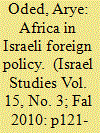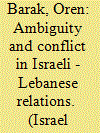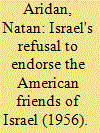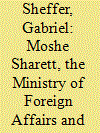|
|
|
Sort Order |
|
|
|
Items / Page
|
|
|
|
|
|
|
| Srl | Item |
| 1 |
ID:
100748


|
|
|
|
|
| Publication |
2010.
|
| Summary/Abstract |
In the 1960s, when most African states south of the Sahara achieved independence, Israel was one of the first countries to establish diplomatic relations with them and to offer them assistance. Israel was a major "donor" in Africa, and Israeli ambassadors operated in 33 countries. Africa had an important place in Israel's foreign policy. However, in 1973, during and after the Yom Kippur War, in an unexpected and severely disappointing move, almost all African countries severed their diplomatic relations with Israel. Ten years later, Israel returned, gradually, to Africa. The article examines the factors that influenced these changes and to what extent Israel drew the necessary conclusions after returning to Africa. Special emphasis is given to the making of Israel-African policy in the 1960s, which still remains the basis of Israel's present activities on the continent, although with significant changes.
|
|
|
|
|
|
|
|
|
|
|
|
|
|
|
|
| 2 |
ID:
100750


|
|
|
|
|
| Publication |
2010.
|
| Summary/Abstract |
The article discusses Israel's ambiguous policy towards Lebanon since the late 1960s and early 1970s and assesses its long-term impact on Israeli-Lebanese relations. Its main argument is twofold: first, Israel reacted to the gradual decline of Lebanon's effective sovereignty in the Lebanese-Israeli border area in the late 1960s and early 1970s by adopting an ambiguous policy, which, while recognizing Lebanon's formal sovereignty, sought to "make up" for its lack of effective sovereignty in the Israeli-Lebanese border area by stepping up Israel's involvement there; second, Israel's ambiguous policy towards Lebanon, together with other factors, such as the armed activities of Palestinian and Lebanese factions in and from South Lebanon, has been a major factor for the continuous violence in the Lebanese-Israeli border area, most recently the war between Israel and Hizbullah in 2006. I conclude with suggestions of how to put an end to the cycle of ambiguity and conflict in Israeli-Lebanese relations.
|
|
|
|
|
|
|
|
|
|
|
|
|
|
|
|
| 3 |
ID:
100749


|
|
|
|
|
| Publication |
2010.
|
| Summary/Abstract |
Israeli public diplomacy surrounding the disengagement from Gaza and the general elections in the Palestinian Authority (PA) in 2005 reflects a problematic misconstruction of Israel's messages in English regarding its relations with the Palestinians. Based on content analysis of official documents, such as official announcements, press releases, and speeches by Israeli government officials (the PM and the foreign ministry), we point to the incompleteness of Israeli public messages aimed at non-Hebrew speakers in terms of major framing functions. Incorporating narrative analysis, we further claim that the problem of missing framing functions is part of a larger problem of misconstruction of the state's foreign policy narrative. At the core of this problem lies a discontinuity between the definition of the problem faced by Israel, the characterization of those who are responsible for the problem, and the proposed solutions to the problem. While the definition of the problem tends to rest quite heavily on internal disputes within Israel, namely the dispute between the government and the settlers, the Palestinians are those who are held responsible for the problem, and the solution is defined as a confrontation with the Palestinians. This incoherence between the definition of the problems and the solutions offered has damaged the internal logic of Israeli public diplomacy. The article discusses these findings against the backdrop of the traditional Israeli approach toward public diplomacy as reflected by the concept of "explanation" (hasbara). It suggests that these incoherencies played a key role in the explanation of why Israel failed to achieve significant improvement in its international image following the disengagement.
|
|
|
|
|
|
|
|
|
|
|
|
|
|
|
|
| 4 |
ID:
100751


|
|
|
|
|
| Publication |
2010.
|
| Summary/Abstract |
The aim in presenting and analyzing the document below on Israel's refusal to endorse the proposed AFI, the American Friends of Israel, in March 1956, which it considered a threat to existing pro-Israel advocacy activities, is not only a fascinating account of the origins of Israel's ambivalence regarding garnering support for its case on Capitol Hill, but also serves as an interesting parallel to the current controversy relating to Israel's policy toward the recently established radical alternative lobby for Israel, J Street. 2
J Street invited Ambassador Michael Oren to address its first Washington conference; however, after an extended delay Oren declined. 3 The embassy issued a statement saying that it would be "privately communicating its concerns over certain policies of the organization that may impair the interests of Israel". J Street leader Jeremy Ben-Ami did not "understand how it is in the State of Israel's interest to look at J Street as a problem, to write off an organization that represents a large number of American Jews."
It should come as no surprise that Oren balked at attending their recent annual conference. Since its inception, the MFA (Ministry of Foreign Affairs) has refused to endorse pro-Israel organizations it has deemed either ineffective or unwilling to be "instructed" by Israel's diplomatic representatives. Although AIPAC (American Israel Public Affairs Committee) 4 was established and financed by American citizens, by sanctioning AIPAC's monopoly Israel has consistently aimed to diminish the competition, thus ensuring that the source, gathering, and dissemination of information would be controlled by Israel.
Israel's foreign relations have been directed by the MFA and its diplomatic representatives who inevitably supplanted the Zionist organizations that had for more than thirty years regarded themselves as the official
|
|
|
|
|
|
|
|
|
|
|
|
|
|
|
|
| 5 |
ID:
100745


|
|
|
|
|
| Publication |
2010.
|
| Summary/Abstract |
Israeli-Austrian relations were uniquely free of the usual concerns of Israeli foreign policy relating to the Arab-Israeli conflict, but were overshadowed by the legacy of WW II and the Holocaust. Austria's proximity to the Soviet bloc and to the 2-3 million Jews behind the Iron Curtain made it a valuable base for Israeli intelligence activities directed to Eastern Europe. Nevertheless, Israel rejected Austria's repeated requested to upgrade the level of formal ties between the two countries, despite the diplomatic immunity that such upgrading would have provided. Israel's Ministry of Foreign Affairs was not prepared to accede to Austria's request until the Austrian state concluded an agreement with the Viennese Jewish community and with the Conference for Jewish Material Claims Against Austria for elementary compensation to the victims of Nazi persecution in that country. Only after an agreement was signed, in 1956, did Israel agree to move from consular to diplomatic representation.
|
|
|
|
|
|
|
|
|
|
|
|
|
|
|
|
| 6 |
ID:
100743


|
|
|
|
|
| Publication |
2010.
|
| Summary/Abstract |
Israel's Ministry of Foreign Affairs (MFA) was officially established on 14 May 1948 when the State of Israel was proclaimed, but extensive diplomatic activity conducted by the Zionist movement and the Jewish Agency preceded its official debut. The authorized body that existed previously-the political department-served as the template for the MFA.
|
|
|
|
|
|
|
|
|
|
|
|
|
|
|
|
| 7 |
ID:
100744


|
|
|
|
|
| Publication |
2010.
|
| Summary/Abstract |
Many observers agree about the marginal position and involvement of the Ministry of Foreign Affairs (MFA) as well as all other ministries active in the sphere of Israeli-Jewish Diaspora relations, which is closely connected to Israeli governments' general positions and attitudes toward the Jewish Diaspora. The article examines the historical sources of this situation in the Israeli government. It discusses especially the role of the MFA, which, theoretically, should have been very closely involved in Israeli-Jewish Diaspora relations. It focuses mainly on the period from 1948 until the mid-1950s.
|
|
|
|
|
|
|
|
|
|
|
|
|
|
|
|
| 8 |
ID:
100747


|
|
|
|
|
| Publication |
2010.
|
| Summary/Abstract |
The secret talks between Jordan and Israel began in 1963 and continued until the two countries signed the peace treaty in 1994. The talks are unique in the history of the Arab-Israeli conflict. The post-Six-Day War talks were held on two tracks: one between Yaakov Herzog, the Director of the PM's office and Zayd al-Rifa'i, King Hussein's private secretary; the second, on a higher level, between Israeli ministers Yigal Allon and Abba Eban and the king. The two sides moved on parallel lines that could never meet. Constraints on both sides contributed to the inevitable logjam. The king genuinely hoped to reach a peace with Israel based on the principles of the Arab Summit and his talks with Nasser. Israel, on the other hand, was reluctant to commit itself to enter into peace negotiations with Jordan, avoiding serious discussion on the principles of peace. Instead it presented the Allon Plan for discussion with the king. Thus, the gap in the positions on the talks' goals, in the components of the solution to the conflict and the peace settlement was unbridgeable. Despite this impasse both parties felt it was in their common interest to pursue the talks, which became a goal in itself. The gap was not only in the concept of peace and talks' objectives, but in all core issues related to peace, such as the territorial issue, especially the status of Jerusalem, and interpretation of UNSCR 242. With hindsight, the core issues in the solution to the West Bank remain unchanged, but the Palestinians replaced Jordan as the main Arab party to determining the future of the West Bank.
|
|
|
|
|
|
|
|
|
|
|
|
|
|
|
|
| 9 |
ID:
100746


|
|
|
|
|
| Publication |
2010.
|
| Summary/Abstract |
The Suez War had long term ramifications for Israel's status in the Middle East and for its relations with the U.S., Europe, and the USSR. This article is a first segment in the examination of the interplay between military and diplomatic means deployed by Israel in its quest to consolidate the gains of the 1948 war and secure its sovereignty. It provides a detailed analysis of the Israeli cabinet deliberations as it reached the decision to authorize war. The article examines the cabinet's opinions on the language of the motion to go to war, the list of casus belli offered, the secret agreement with France and Britain which precipitated the war, considerations of possible complications, the theory of war and peace, the likelihood of regime change in Egypt, and the preparedness of the home front. It raises the question of the relevance of the comparative size and strength of a nation as it ponders the option of launching a war.
|
|
|
|
|
|
|
|
|
|
|
|
|
|
|
|
|
|
|
|
|